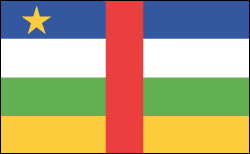Central African Republic History


Coup by Muslim Rebels Sinks Country into Civil War
In presidential elections in early 2011, incumbent François Bozizé (National Convergence Kwa Na Kwa) won reelection with 64.4% of the vote. In March 2013, Bozizé was ousted by rebels from the northern part of the country. The rebels, who are mostly Muslim and collectively known as Seleka, have been engaged in battles with government troops and said they overthrew Bozizé because he failed to follow through on earlier peace deals. Bozizé's presidency was marred by allegations of corruption and cronyism—hardly a surprise in one of the world's poorest and most unstable countries. Michel Djotodia, the coup leader, assumed power, suspended the constitution, and dissolved parliament. In mid-April he created a transitional national council that named him interim president. He was sworn in as head of state in August and promised to hold free and fair elections within 18 months. The African Union suspended the country in response to the coup, and refused to recognize Djotodia as president.
Djotodia was not able to stem the violence in the country, and CAR spiralled into chaos. Seleka rebels terrorized civilians, and Christian opponents formed their own militias to retaliate and defend themselves and were equally as brutal to Muslims. About 1 million people, in a country of 5 million, fled their homes. Many of those fleeing were farmers and herders, and officials feared that their absence would lead to famine. In October, UN Secretary-General Ban Ki-moon said the country had experienced "total breakdown of law and order," and he authorized the deployment of a peacekeeping force. In December, the African Union said it would increase the size of its force there from 3,500 troops to 6,000. France deployed 1,600 soldiers to CAR, a former colony of France. Many feared that CAR was on the brink of experiencing a genocide. In April 2014, the UN authorized a force of 12,000 peace-keeping troops. They were deployed to CAR in September.
At the urging of regional leaders, Djotodia resigned in January 2014 for his failure to stem the escalating violence between Christians and Muslims that left the country in tatters. In January, the 135-member national transitional council elected Catherine Samba-Panza, an insurance broker and the mayor of the capital, Bangui, as interim president. She will serve for one year until elections are held in January 2015. She will not run in the elections. The council named André Nzapayeke as prime minister. Both the interim president and prime minister are Christians.
A cease-fire was signed in July 2014 by the rival Muslim and Christian militias, but it collapsed just two weeks later. In August, Mahamat Kamoun was appointed prime minister. The country's first Muslim prime minister, Kamoun previously worked for Djotodia. He must put together a transitional government.
See also Encyclopedia: Central African Republic .
U.S. State Dept. Country Notes: Central African Republic







